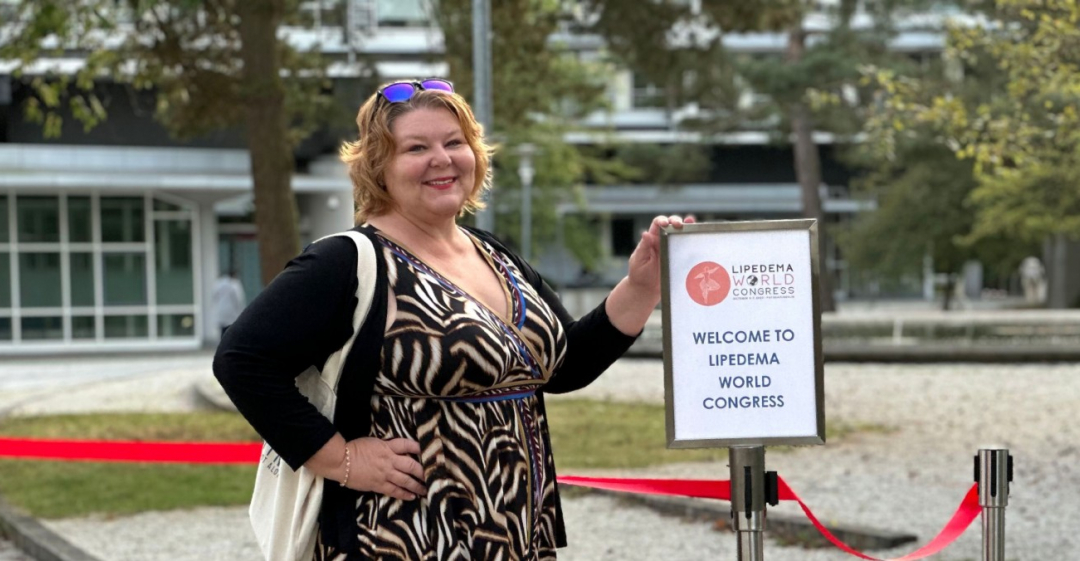“I wasn’t being appreciated or fully used at work.”

What work were you doing previously?
I worked for the US government at the Federal Aviation Administration for the last 28 years.
I was in upper management and even travelled internationally to represent the US government.
Over the years I'd moved up from typing in accident reports to managing very large organizations with multiple division managers, countless employees and contractors on my team.
I worked on things like Information Technology software development, project management, and worked on very very large contracts valued up to a billion dollars.
What are you doing now?
I run LegsLikeMine.com, a social media presence supporting the 11% of women in the world who have a condition called lipedema.
In this job, I author books (I've four published now), am making a line of shoes to meet our unique needs, share information and education on managing and identifying lipedema, and then I get to do fun things like photo shoots for outfits that disguise our larger than standard legs.
Why did you change?
Being very frank here, I’d been thinking about a change for some time as I’d hit the pay ceiling at my old job and didn’t see any other progression available.
I travelled very frequently, and it caused my legs to swell and be painful. Additionally, I was working on LegsLikeMine on the side and felt I never had enough time to work on it the way I wanted to.
I had some incidents towards the end that signified to me I wasn’t being appreciated or fully used and it was probably actually past time to move on.
When was the moment you decided to make the change?
I had a pretty bad situation at work where I needed to take sick leave for surgery on my legs, and I was actually demoted.
I worked in a 76% male industry and lipedema affects only women, and my second-level boss stopped a promotion for a job he had me do for eight months. He treated me like I was making up my condition.
It's very rarely diagnosed correctly and still only about 5% of doctors are aware of it. I get it, but that act really changed my loyalty to my old job.
Long story short, I filed all kinds of complaints, and raised all kinds of hell, but I still lost the battle and my need for reasonable accommodation was denied.
I knew at that time that I didn’t want to be there any longer, despite having moved my way up.
How did you choose your new career?
It chose me.
As I went in for surgeries and treatments, I started documenting my story and recoveries on YouTube.
During surgery recovery I was answering upwards of 1,000 emails a day based on my posts on YouTube and my blog. Women were absolutely desperate for information, and for someone to listen.
I was answering the same questions over and over, so that inspired me to write Jeans on a Beach Day, so I could refer my ladies to the book or to my blog to get better answers.
Are you happy with the change?
Yes.
I feel I’m busier than ever, my work matters to so many women who’ve been ignored by fashion, medicine, and other areas. I can’t wait to bring footwear to these ladies, some of whom don’t have shoes and don’t leave the house because of it.
While early phases of major projects like this take a little time to monetize, what’s really important to me is that I’m actually doing something that solves real world problems and I’ll live to see the results.
What do you miss and what don't you miss?
I miss being at the head of the board room table, that’s where I’m at my best.
I also miss having what felt like an unlimited budget and resources to make things happen.
On the flip side, I don’t miss countless wasted hours in meetings, made up emergencies (we called them Fire Drills), and working deep, deep inside a patriarchal organization that claimed to be diverse.
I also don’t miss the fluctuations in budget and direction given the political tune of the day. Now I have a set vision and I’m in charge of the budget.
How did you go about making the shift?
It chose me!
I asked for reasonable accommodations to reduce stress, as it affected my legs. I was denied and that opened the door for me to actually retire early from the profession, and jump in with full force into LegsLikeMine.
I haven’t looked back since.
How did you develop (or transfer) the skills you needed for your new role?
I hired consultants for my social media presence.
They helped me clean up my blog and all my social posts to be branded and consistent.
On the footwear front, I hired a fantastic consultant (Susanah Davdah, also a career changer), who has educated me, prepared me, and connected me with other professionals in the footwear industry.
What didn’t go well? What wrong turns did you take?
I probably should have hired publicists for my books, although they’re selling well.
I also should have gone to some form of therapy to recover from my bad vibes from my former career. I’m working on it and now am at a point where I can be grateful for all of the opportunities that I had in my previous career.
I should have left earlier but hung on because the pay was very good.
How did you handle your finances to make your shift possible?
I still get a small retirement stipend each month and I have savings that I’ve been tapping into this year.
I also took out a small loan on my home to fund the R&D on the footwear line that I’m planning to be able to repay in full next year when the shoes are out on the market.
What was the most difficult thing about changing?
Going from constantly being on the move and being managed by my schedule (which was always full of meetings on Zoom nine hours a day), to being able to manage my own time.
It’s nice to be able to accomplish a full day’s work in a few hours and have time to do self care, research reading, exercise, or even have guilt-free days off.
But it’s also hard to wake up and be like, “I have no meetings on the calendar. What do I do today?” on days where I haven’t mapped out my priorities.
I miss being in the office in terms of seeing people and being able to help others each day. That will change as soon as the shoes run off the line, and I’ll have a warehouse of people and full-time staff to help me.
What help did you get? 
My consultants have been fantastic to work with.
I’ll be ending the contract with my social media team shortly as they’ve taught me how to manage things, set up a mailing list, set up Shopify, and given me fantastic insights as to what posts are effective and which ones aren’t the best at getting traffic.
What resources would you recommend to others?
I’d say join the local chamber of commerce and talk with your local small business association.
See if you qualify for funding, before you spend your own money or take out a loan or mortgage to help. There may be programs to help you get started.
Also join associations for the industry you’ll be entering. Learn as much as your brain can hold every day. Network far and wide.
What have you learnt in the process?
My head feels like it’s going to explode after this year!
I’ve learned how to manage a full social media enterprise, photography, fashion, how to make up outfits, affiliate marketing, how to get a book narrated, how to publish books.
I've learned how to do poster presentations at conferences, how shoes are made, where suppliers meet up with buyers, how to connect with a footwear manufacturer, and how to get on all kinds of podcasts and media circuits.
What do you wish you'd done differently?
I wish I’d learned a tiny bit more about the shoe industry before some of my big investments, like taking some sourcing trips too early.
What would you advise others to do in the same situation?
If you’re leaving a job because of a discrimination type of situation, get a lawyer so you don’t miss small details (and lose your case!), and do it as soon as possible.
Get a therapist to work through your issues as soon as you can so you can move on and be positive and progressing again.
Get a consultant if you’re entering a new market. Shop around before you pay a big price for support so you understand what the going rate is.
To find out more about Susan's work, visit www.instagram.com/Legs_LikeMine
What lessons could you take from Susan's story to use in your own career change? Let us know in the comments below.



